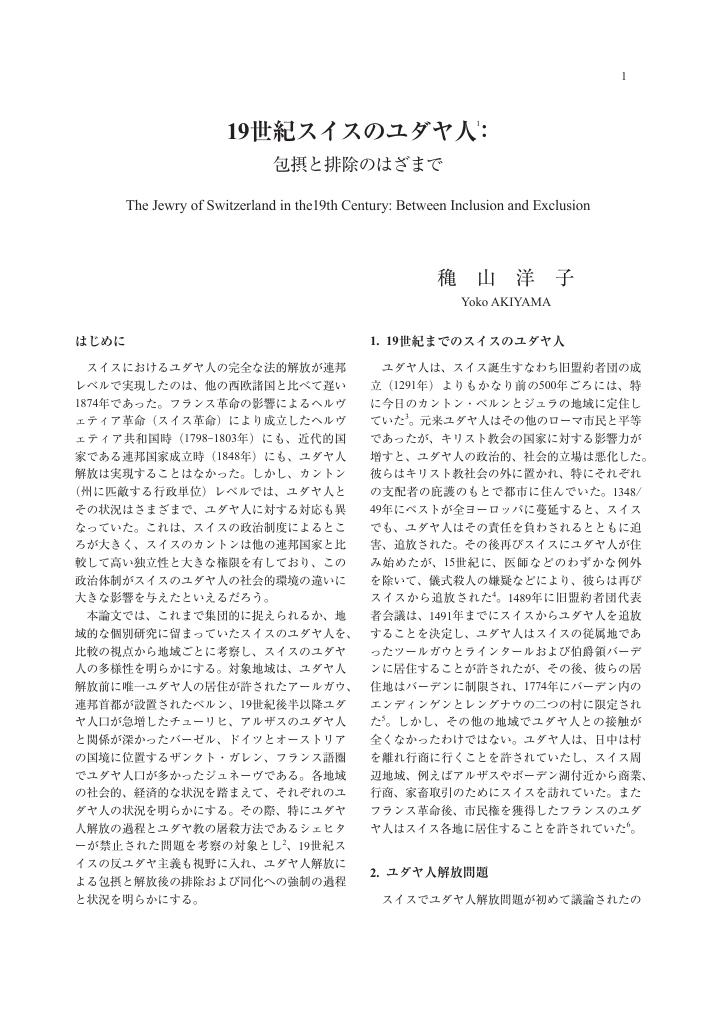3 0 0 0 OA 19世紀スイスのユダヤ人 包摂と排除のはざまで
- 著者
- 穐山 洋子
- 出版者
- 日本ユダヤ学会
- 雑誌
- ユダヤ・イスラエル研究 (ISSN:09162984)
- 巻号頁・発行日
- vol.28, pp.1-11, 2014 (Released:2017-04-07)
2 0 0 0 IR スイスにおけるナショナル・マイノリティ「移動型民族」の文化的同化の強制
- 著者
- 穐山 洋子 アキヤマ ヨウコ Akiyama Yoko
- 出版者
- 同志社大学グローバル地域文化学会
- 雑誌
- GR : 同志社大学グローバル地域文化学会紀要 : Doshisha Global and Regional Studies review : the journal of the Doshisha Society for Global and Regional Studies (ISSN:21879060)
- 巻号頁・発行日
- no.7, pp.1-29, 2016-10
論文(Article)スイスでナショナル・マイノリティと認定されている「移動型民族」が、19世紀後半から、特に非定住生活が問題視され、差別と排除の対象となった。20世紀前半からは、その子どもたちに対して、定住生活を強制する措置が連邦、地方自治体、市民団体によって行われ、スイス市民社会もそれを容認した。本論では、「移動型民族」の差別と迫害の歴史的経緯を明らかし、特に子どもたちに対する強制措置が行われた社会的、時代的、思想的およびスイス特有の背景について考察している。This article focuses on the historical processes of discrimination against 'Travellers', specifically analysing the social constellation and the ideological background. This study aims to examine the correlation between the forced cultural assimilation of Travellers and the cohesion of Switzerland. There are currently an estimated 30,000 to 35,000 'Travellers' in Switzerland. These people have legal recognition as one of Switzerland's national minorities. In Switzerland, the state, the legislative authority, and the civil society have regarded the Travellers and their non-sedentary lifestyles as deviations of bourgeois values. From the late nineteenth century until the 1970s, Swiss authorities tried to force—in some cases violently—Travellers to become sedentary.
1 0 0 0 19世紀スイスのユダヤ人:包摂と排除のはざまで
- 著者
- 穐山 洋子
- 出版者
- 日本ユダヤ学会
- 雑誌
- ユダヤ・イスラエル研究 (ISSN:09162984)
- 巻号頁・発行日
- vol.28, pp.1-11, 2014
1 0 0 0 OA 1893 年のシェヒター禁止と 19 世紀後半スイスの文化的ネーション形成
- 著者
- 穐山 洋子
- 出版者
- 現代史研究会
- 雑誌
- 現代史研究 (ISSN:03868869)
- 巻号頁・発行日
- vol.60, pp.21-39, 2014-12-20 (Released:2017-07-01)
- 参考文献数
- 78

